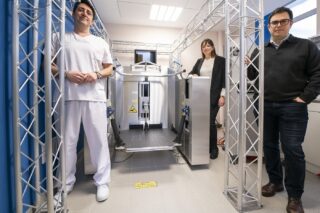BrainTale’s innovative platform leverages calibrated diffusion tensor imaging to accurately differentiate Parkinson’s Disease from other Parkinsonian syndromes, enhancing diagnostic precision and advancing neurological research and treatment.
BrainTale, a medtech spin-off from the Assistance Publique-Hôpitaux de Paris, is making significant strides in the field of neurology by leveraging digital biomarkers for the differential diagnosis of parkinsonian syndromes. This breakthrough was highlighted at the 10th European Academy of Neurology (EAN) Congress held in Helsinki from June 29 to July 2, 2024.
At the EAN Congress, BrainTale presented findings from a study involving 189 subjects exhibiting Parkinsonian symptoms. This study showcased the capabilities of BrainTale’s platform in distinguishing Parkinson’s Disease (PD) from other neurodegenerative conditions with similar clinical features, such as Multiple System Atrophy (MSA) and Progressive Supranuclear Palsy (PSP). The study was presented by Vincent Perlbarg, co-founder and scientific director, and Martin Grange, data scientist at BrainTale.
World Alzheimer’s Month is the international campaign from Alzheimer’s Disease International that takes place every September.
Study Insights
BrainTale’s study represents a significant breakthrough in the differential diagnosis of parkinsonian syndromes, involving a carefully selected cohort of 189 subjects. Among these participants, 92 were diagnosed with Parkinson’s Disease (PD), 45 with Multiple System Atrophy (MSA), and 42 with Progressive Supranuclear Palsy (PSP). Utilizing calibrated diffusion tensor imaging (DTI), BrainTale’s platform analyzed the participants’ brain data to extract diffusion markers, which serve as quantitative indicators of white matter integrity. This advanced MRI technique provides detailed insights into neurodegenerative processes, forming the foundation for an accurate diagnostic model.

The extracted diffusion markers were then analyzed using a supervised learning classification model designed to differentiate between PD, MSA, and PSP based on their unique diffusion profiles. The effectiveness of this model was evaluated through receiver operating characteristic (ROC) curve analysis, a robust method for assessing diagnostic accuracy. The study achieved an impressive average area under the ROC curve (AUC) of 0.87 ± 0.05, indicating high diagnostic performance. Additionally, the model demonstrated an average specificity of 0.74 ± 0.10 and an average sensitivity of 0.90 ± 0.07, reflecting its ability to accurately identify true cases of PD and reduce false positives.
These findings highlight the exceptional sensitivity and specificity of BrainTale’s diffusion markers in distinguishing PD from other parkinsonian syndromes like MSA and PSP. The high accuracy of the classification model underscores the platform’s potential to revolutionize clinical diagnostics by providing a non-invasive, reliable tool for differential diagnosis. Furthermore, this technology holds promise for advancing research into the pathophysiology of neurodegenerative diseases and facilitating the development of targeted therapies. By integrating BrainTale’s platform into clinical and research settings, the diagnostic process for parkinsonian syndromes can be significantly improved, ultimately enhancing patient care and treatment outcomes.



Implications for Clinical Practice
Professor Stéphane Lehéricy, a neuroradiologist at Pitié-Salpêtrière and director of the CENIR at the Brain Institute, praised the accessibility and clinical utility of BrainTale’s diffusion tensor imaging markers. He highlighted that this technology not only improves differential diagnostics but also accelerates the development of treatments. By providing non-invasive, reliable, and clinically validated measurements, BrainTale’s platform facilitates a better understanding of the pathophysiology of various neurodegenerative diseases and enhances patient care.
BrainTale specializes in the quantification and standardization of white matter through a software-based medical device solution. This platform offers non-invasive, quality-controlled clinical reports derived from DTI data. By providing objective measures, BrainTale supports the development of new therapies and assists clinicians in making informed decisions. Their technology aims to transform brain care by addressing the growing medical challenges posed by brain diseases.
BrainTale’s innovative approach to diagnosing parkinsonian syndromes marks a significant advancement in neurology. By improving diagnostic accuracy and understanding of neurodegenerative diseases, BrainTale is poised to enhance patient outcomes and expedite the development of effective treatments.
BrainTale continues to push the boundaries of brain health, with a commitment to faster, more accurate diagnosis and treatment of neurological conditions.










